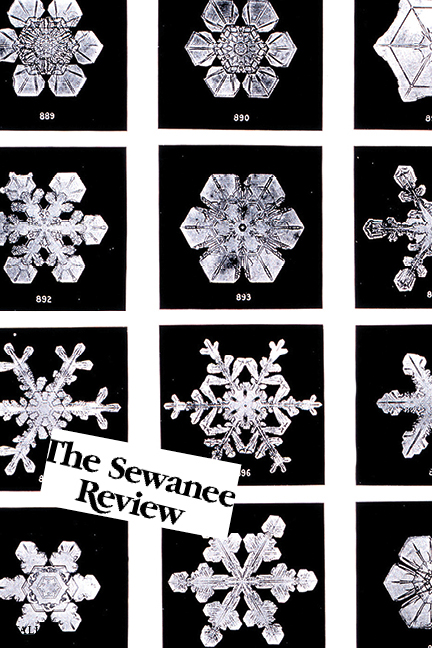The Winter 2019 issue of the Sewanee Review publishes online this coming Monday, January 7th, the print version mails on January 9th, and we couldn’t be more excited about it. It’s the first of the new volume, our 127th, and the first of the new year. But the thrills of publishing a magazine come in stages, from acceptance of the poetry and prose that comprise the issue to seeing the magazine in first proofs. Perhaps our favorite moment, second only to receiving the issues in all their thingness, is when our designers, the great Peter Mendelsund and Oliver Munday, send us their cover ideas and we get to pick one. The staff gathers round my monitor, girded for a tough decision, and in less than an instant says, “That’s it,” as if the cover chose us as its medium.

The issue’s contributors are as varied as the snowflakes that grace our cover. New poetry by Ishion Hutchinson, whose collection House of Lords and Commons we passed around our office like weapons-grade contraband. If it’s your first time reading Ange Mlinko, our resident poetry genius, assistant editor Spencer Hupp, calls her “as rewardingly difficult as she is deftly musical.” We first published Jennifer Habel’s work in the Winter 2017 issue; we’re thrilled to be publishing her second set of “Jane” poems. New Yorker poetry critic Dan Chiasson picked our first annual poetry contest winner, Cate Lycurgus’s poem, “Locomotion,” out of several hundred entrants. And then there’s poetry by Heather McHugh, our 2018 Aiken Taylor Award winner, whose body of work Chiasson lovingly examines in his essay on her oeuvre. We’ll announce the 2019 Aiken Taylor winner at the end of the month.
Cally Fiedorek’s “Easy Living,” about a New York socialite, sat me down and made me laugh out loud—no mean feat. Michener fellow Ally Glass-Katz tackles football head injuries (no pun intended) in “Silvermans.” Jamil Jan Kochai’s “Saba’s Story,” makes you believe the hype about his forthcoming debut novel, 99 Nights in Logar. Danielle Evans chose Lily Meyer’s “On Being Human” as our fiction contest winner. Of Meyer’s tale, Evans writes, “The confident voice of ‘On Being Human,’ and its capacity for sharp and revealing description, make the campus feel familiar and the narrator feel like an old friend, which makes it all the more delightful when this story turns, repeatedly, away from the expectations it has created and into something more complicated and alive.”
There’s a review of Hilary Spurling’s biography on Anthony Powell, as well as a reappraisal of the latter’s A Dance to the Music of Time, by Adam Kirsch. Merritt Moseley, who has been writing about the Man Booker Award for the Review since 1993, recaps the 2018 Booker Prize finalists and the winner. Maurice Manning’s delightful essay on the economies of poetry and nature is as lucid as his verse. We are lucky to be publishing Whiting Award winner Esmé Weijun Wang’s harrowing essay about mental illness on campus, “Yale Will Not Save You,” which appears in her revelatory The Collected Schitzophrenias. Stephanie Danler writes about the liminal, magical state of pregnancy (she gave birth to a happy, healthy boy this past December) in her second work of nonfiction for us. Catherine Lacey, whose story “Family Physics” we published in Fall 2018, and whose collection Certain American States James Wood called one of “Four Books that Deserved More Attention in 2018,” concludes this issue with a craft essay that any aspiring writer will come away from just a bit clearer on what she’s trying to say in her own draft. Enjoy, and, if you haven’t yet, subscribe here, lest you miss out. Subscribe before January 15, and enjoy a 10% discount with the offer code “sr-holiday.”
